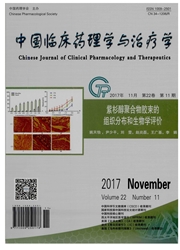

 中文摘要:
中文摘要:
目的:评价N-甲基-M-天冬氨酸(NMDA)受体拮抗剂硫酸镁对持续输注瑞芬太尼引起术后痛觉过敏的预防作用。方法:行脊柱侧弯矫形手术患者75名,年龄10~25岁,ASA分级I~II级,随机被分为3组,每组25例:S组(术中持续以0.05μg·kg^-1·min^-1速率输注瑞芬太尼),R组(术中持续以0.4μg·kg^-1·min^-1速率输注瑞芬太尼),M组(术中持续以0.4μg·kg^-1·min^-1速率输注瑞芬太尼,并在输注前给予硫酸镁40mg/kg静滴,继以20mg·kg^-1·h^-1的速率持续输注至术毕)。术后用芬太尼进行病人自控镇痛(PCA)。观察病人术后48h内(PCA)药液使用量和疼痛评分。结果:术后36h和48h内,R组病人的术后芬太尼需求量显著高于S组(P〈0.05)。术后24、36和48h内,M组病人的术后芬太尼需求量显著少于R组(P〈0.01)。术后3组病人疼痛评分无显著差别。结论:瑞芬太尼术中持续输注(0.4μg·kg^-1·min^-1)会诱发术后痛觉过敏,术中输注硫酸镁可以抑制瑞芬太尼导致的痛觉过敏。
 英文摘要:
英文摘要:
AIM: To evaluate the effect of magnesium sulphate (a NMDA-recepter antagonist) on remifentanil-induced postoperative hyperalgesia. METHODS: Seventy-five patients undergoing scoliosis surgery (ASA I-II, aged 10- 25 years) were randomly assigned to three groups (n = 25) : Group S (intraoperative rernifentanil at 0. 05 μg·kg^-1·min^-1 ) ; Group R ( intraoperative remifentanil at 0. 4 μg·kg^-1·min^-1 ); Group M (intraoperative remifentanil at 0.4 μg·kg^-1·min^-1 , accompany with induction dose of 40 mg/kg magnesium sulphate, followed by an intraoperative infusion of 20 mg · kg^-1· h^-1 till the end of surgery). Patient controlled intravenous analgesia (PCA) was performed with fentanyl after operation. Cumulative injected volume of the PCA and pain scores were recorded during 48 postoperative hours. RESULTS. During 36h and 48h postoperative fentanyl consumption was less in Group S than that of Group R (P〈0.05). During 24 h, 36 h and 48 h postoperative fentanyl consumption was less in Group M than that of Group R (P〈0.01). There were no significant differences in pain scores in the three groups. CONCLUSION. Intraoperative infusion of remifentanil at 0.4 μg·kg^-1·min^-1 triggers postoperative secondary hyperalgesia. Perioperative magnesium sulphate supplementation could alleviate the hyperalgesia induced by remifentanil.
 同期刊论文项目
同期刊论文项目
 同项目期刊论文
同项目期刊论文
 Intrathecal Administration of the Cannabinoid 2 Receptor Agonist JWH015 Can Attenuate Cancer Pain an
Intrathecal Administration of the Cannabinoid 2 Receptor Agonist JWH015 Can Attenuate Cancer Pain an The respective and interaction effects of spinal GRs and MRs on radicular pain induced by chronic co
The respective and interaction effects of spinal GRs and MRs on radicular pain induced by chronic co 期刊信息
期刊信息
